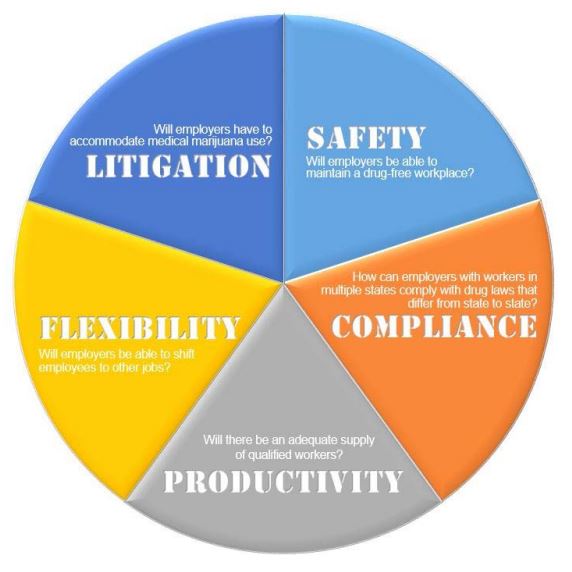With the adoption of more state laws to legalize marijuana, employers will face challenges to protect their employees from injury and to comply with federal requirements to maintain a drug-free workplace.
Employers also face potentially costly litigation as case law surrounding legal marijuana develops, according to the Quest Diagnostics whitepaper “What Will ‘Legal’ Marijuana Cost Employers?”
Quest reports that medical marijuana legalization brought forth a new phenomenon: the production of marijuana-infused foods and gadgets, which presents a special problem for employers. Today, nearly half of marijuana users in states where it is legal consume marijuana by eating it rather than smoking it. In addition, vape pens, which are like e-cigarettes but contain capsules of concentrated marijuana oils, leave no marijuana smell and are impossible to tell apart from e-cigarettes. These two modes of consumption will make it more difficult, if not impossible, for employers to tell when employees are using marijuana on the job.
As marijuana use increases, so will workplace injuries, accidents, mistakes, and employee illnesses, escalating the costs of companies’ liability, workers’ compensation and health insurance.
Questions companies should ask include:
- Will employers have to accommodate marijuana use in their workplaces? A closely watched case. Before the Colorado Supreme Court will establish, at least in Colorado, whether employees can use marijuana off the clock even if they may be impaired the next day.
buy tenormin online www.methanol.org/wp-content/uploads/2022/08/png/tenormin.html no prescription pharmacy
- Must employers pay for employees’ medical marijuana if they are injured on the job? By allowing a court of appeals decision to stand, the New Mexico Supreme Court finds that the answer is yes.
- Will the use of legal cannabinoids like delta 8 THC be allowed in the workplace?
- What does increased adolescent marijuana use portend for the future workforce? Research shows that compared to nonusers, teens who smoke marijuana on weekends over a two-year period are six times more likely to drop out of high school, three times less likely to enter college, and four times less likely to earn a college degree?
- How can employers meet federal requirements to maintain a drug-free workplace if states require proof of impairment rather than the presence of marijuana in the body when no level of impairment has been scientifically established and no noninvasive test to denote impairment has been developed?
- If courts hold that drug testing is no longer a valid indicator of impairment, how can employers whose businesses involve driving or other safety-sensitive positions protect their workers and the public from injuries and deaths cause by stoned drivers?
- What if courts hold that failing a pre-employment drug test is no longer a valid reason to deny employment to applicants?
There are, however, steps employers can take to protect themselves:
1) Stay up-to-date with the changing legal landscape and adjust workplace policies accordingly.
2) Remember that marijuana is still illegal under federal law.
3) Join other employers to monitor state legislation and take action with legislators to ensure workplace protections are included in any marijuana laws.
4) Educate your workforce about the dangers marijuana poses to children, families and the workplace.
5) Challenge the notion that marijuana is medicine, or risk paying for it in your health insurance program. No marijuana medicines being sold in states that legalized them have been approved by FDA as pure, safe, or effective.
Doctors cannot prescribe them and pharmacies cannot sell them.

